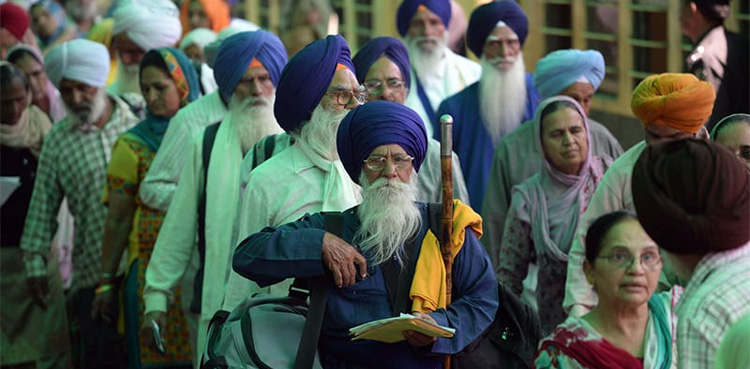
India’s recent decision to grant citizenship to a select group of Afghan Sikhs has brought to light the country’s complex and often contradictory approach to refugee policy. While this move is being lauded by some as a humanitarian gesture, it is impossible to ignore the underlying biases and strategic motivations that appear to be driving India’s selective approach to citizenship. The exclusion of Afghan Muslims from this process raises significant concerns about the sincerity of India’s commitment to helping those in need and the potential impact of this policy on its relationship with Afghanistan.
The announcement that the first group of Afghan Sikhs has been granted Indian citizenship comes amid the ongoing review of 400 applications, primarily from non-Muslim minorities. This selective granting of citizenship aligns with India’s controversial Citizenship Amendment Act (CAA), which provides a pathway to citizenship for religious minorities from neighboring countries, excluding Muslims. By focusing on Afghan Sikhs while sidelining Muslim refugees, India is sending a clear message about its priorities and the role that religion plays in its refugee policy.
This exclusion is particularly troubling given the demographic realities of Afghanistan, where Muslims make up the vast majority of the population. By denying Afghan Muslims the same opportunity for citizenship, India is effectively ignoring the plight of a large segment of refugees who are fleeing the same dangers as their Sikh counterparts. This selective policy not only undermines India’s secular image but also calls into question its commitment to universal human rights. How can India claim to be a friend of Afghanistan when it is willing to help only a select few, while leaving others to fend for themselves?
The exclusion of Afghan Muslims from India’s citizenship process also has significant implications for its relationship with Afghanistan. As an Islamic country, Afghanistan may view India’s selective policies as hypocritical and disrespectful of its religious identity. This perceived bias could strain diplomatic relations between the two countries and weaken India’s ability to foster a genuine and balanced friendship with Afghanistan. Furthermore, it raises questions about the credibility of India’s claims of friendship with the Islamic Emirate of Afghanistan, as the exclusion of Muslim refugees suggests a lack of respect and consideration for Afghanistan’s majority population.
India’s approach to citizenship is further complicated by its treatment of Sikhs in other countries. While the Indian government presents itself as a protector of Afghan Sikhs, it has been accused of persecuting Sikh activists in Canada and pressuring the Canadian government to crack down on Sikh separatist movements. This contradictory behavior raises doubts about the sincerity of India’s efforts to support Afghan Sikhs and suggests that its decision to grant citizenship may be more about strategic positioning than a genuine concern for vulnerable communities.
The timing of India’s decision also suggests that domestic politics may be at play. With rising nationalist sentiments and increasing polarization within the country, the government’s move to grant citizenship to Afghan Sikhs could be seen as an attempt to appease its domestic support base. By positioning itself as a protector of non-Muslim minorities from Muslim-majority countries, the Indian government is likely catering to its nationalist supporters while further entrenching religious divides within the country. This strategic use of citizenship as a tool for domestic political gain raises serious concerns about the impact of these policies on India’s secular fabric and its standing on the international stage.
The broader implications of this move extend beyond India’s borders. The exclusion of Afghan Muslims from the citizenship process could strain India’s relationships with other Muslim-majority countries, particularly in the Middle East and South Asia. These countries may view India’s policies as discriminatory and inconsistent with the principles of equality and justice that it claims to uphold. This could potentially isolate India on the international stage and undermine its efforts to project itself as a global leader in humanitarian and human rights issues.
Moreover, India’s selective approach to citizenship may have long-term consequences for its regional influence, particularly in Afghanistan. By excluding Afghan Muslims, India risks alienating a significant portion of the Afghan population and weakening its ability to compete with Pakistan for influence in the region. This perceived bias could also fuel anti-Indian sentiment in Afghanistan and other Muslim-majority countries, further complicating India’s efforts to maintain stability and security in the region.
In conclusion, while India’s decision to grant citizenship to Afghan Sikhs may appear to be a humanitarian gesture, it is fraught with contradictions and underlying biases that raise serious questions about the country’s true motivations. The exclusion of Afghan Muslims from this process highlights the selective and strategic nature of India’s refugee policy and calls into question its commitment to universal human rights. As India navigates its complex regional relationships, it must carefully consider the broader implications of its policies and strive to uphold the principles of equality and justice that it claims to champion.
